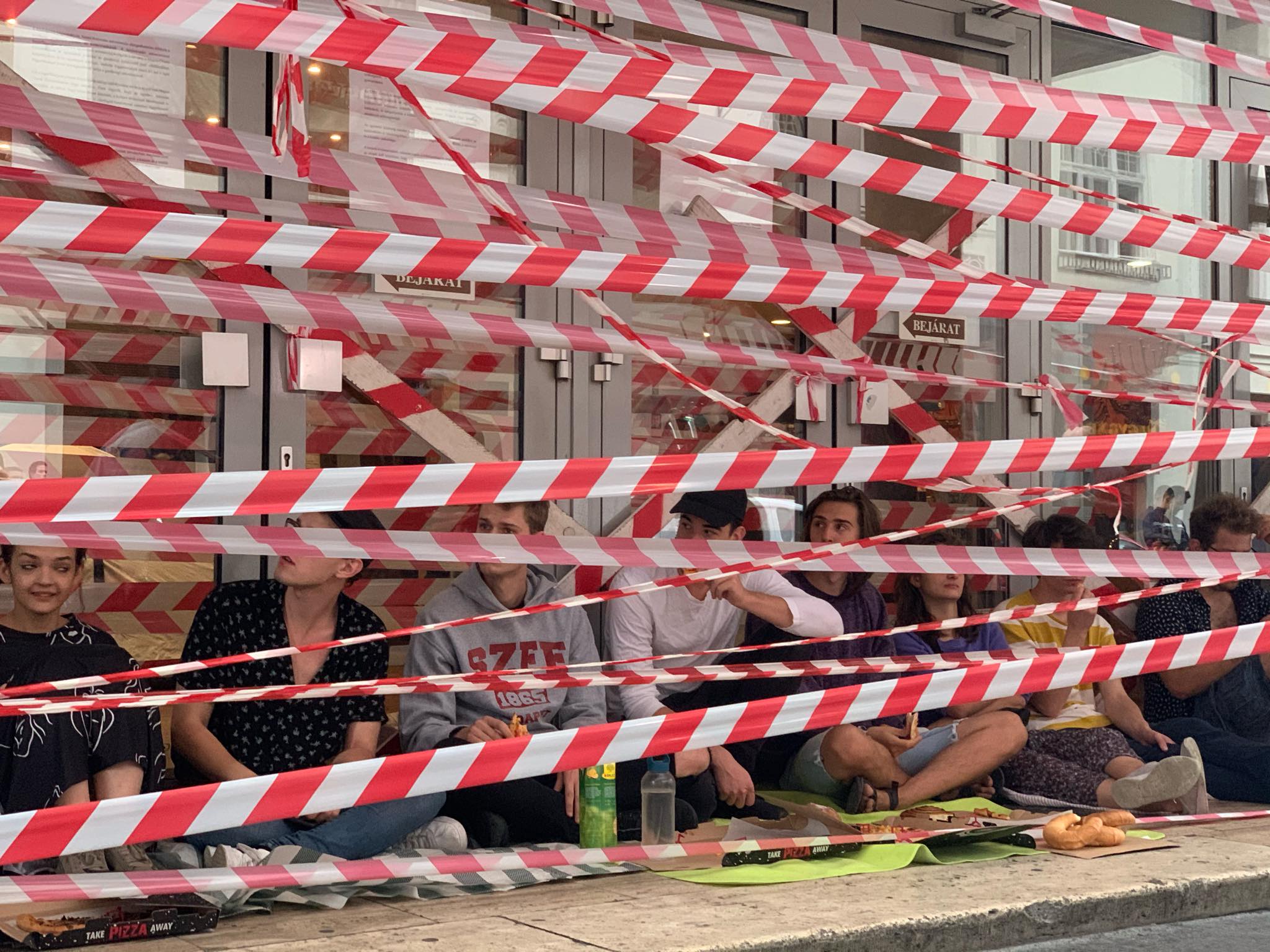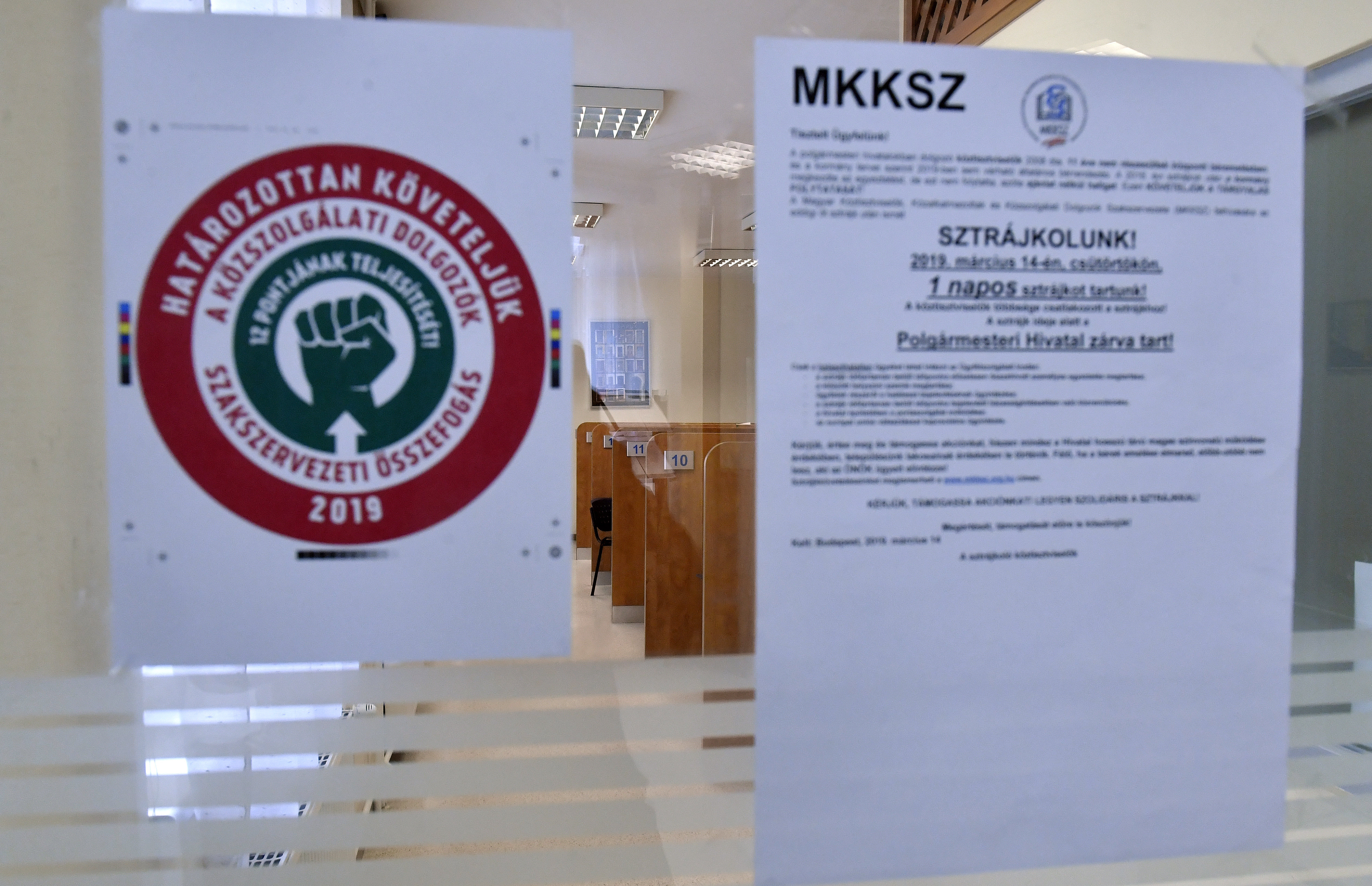Students occupy top arts university after leadership resigns over autonomy fears
- Stay updated on the latest news from Hungary by signing up for the free InsightHungary newsletter:
Several hundred students of the prestigious University of Theatre and Film Arts (SzFE) in Budapest occupied a campus building on Monday amid a struggle with the government over the university's autonomy.
SzFE leaders - including the acting rector, deputy rector, and the heads of each of the university's faculties - resigned on Monday in protest over a new government-imposed management model which saw the university's democratically-elected senate stripped of its powers, and replaced with a board of directors stacked with government appointees.
The leaders argued that the restructuring occurred without any consultation with the university, and that the government had rejected all the university's nominees to the new board of directors.
Following a demonstration on Monday, around 250 students occupied the university's Budapest campus, saying they would not allow any members of the new leadership to enter the building. The students' list of demands includes:
- guaranteed autonomy for the university
- the revocation of the law which alters their university's management model
- the resignation of the new board of directors
- reinstatement of powers to the democratically elected senate
- rejection of the new method of appointing university leaders and board members
- continued state funding of the university
- that the administrative rights over the university not be transferred to the foundation.
At a press conference in front of the building on Tuesday, a delegation of students said they would only allow current staff and students to enter the building until further notice. According to an internal poll taken by the university's Students' Union (HÖK), 100 percent of student respondents rejected the restructuring, and nearly 70 percent believe its true aim is the "long-term, ideological and political occupation of the institution.”
As a result of the restructuring, key decision-making powers will be exercised by the board of directors of the foundation, including adoption of operational regulations, budgetary decisions and development plans, as well as the selection of the rector and the appointment of department heads. Members of the new board of directors include two executives of the state-owned energy company MOL. The chairman of the board is Attila Vidnyánszky, a former director of the Hungarian National Theatre who has routinely made derisive comments about SzFE and its faculty, and is considered to be a close ally of the ruling Fidesz party.
As we reported in June, university leaders and students have argued that the transfer of ownership of the 155-year-old state-run university to a private foundation is an attempt to place it under political control and centrally dictate its operations and cultural output. Some observers also predict that the quasi-privatization of SzFE and other Hungarian universities will result in further state divestment from higher education while reducing the universities' autonomy.
Citizens of V4 countries may enter Hungary despite border closures
Citizens of three central European countries will be granted exceptional permission to enter Hungary following coronavirus-related border closures that took effect on Tuesday, Foreign Minister Péter Szijjártó announced on Monday.
Czech, Slovak and Polish citizens that booked accommodations in Hungary before September 1 will be allowed to enter the country if they present a negative coronavirus test no more than five days old. The border closure, which banned entry to nearly all foreign citizens after a steep rise in new coronavirus cases in Hungary, will remain in effect for citizens of all other countries.
The decision came after Czech Prime Minister Andrej Babis asked Prime Minister Viktor Orbán at a conference in Slovenia early this week to make a travel exception for Czech citizens. On Monday, the exception was extended to all citizens of V4 countries.
Critics of the decision argued that entering Hungary is now easier for foreign citizens of the V4 than for Hungarian citizens returning from abroad: upon arrival, Hungarians must submit to a 14-day quarantine period which can only be abridged by two negative PCR tests conducted in Hungary at their own expense. (Orbán's chief of staff earlier said that the government does not consider tests conducted abroad to be reliable.) The exception allows V4 citizens to enter with only one test, conducted in their own countries, and does not require quarantine. Similar exceptions were made for foreign participants in Hungarian sporting events.
On Monday, two members of the European Commission wrote a letter to Hungary, arguing the exceptions for V4 citizens threatened "the integrity of the Schengen area and of applying border measures in a non-discriminatory way to all EU citizens and residents."
The government defended the border closures by saying that introduction of the coronavirus from abroad represents the greatest epidemiological risk. However, a pandemic advisor to the government said in an interview Monday that less than 10 percent of new virus cases in Hungary can be attributed to foreign travel.
Recent statistics from the V4 countries raise questions over Hungary's decision to grant travel exemptions to their citizens: daily new coronavirus cases in Czechia, Slovakia and Poland have risen dramatically in recent days with Poland registering six times more daily cases than Hungary. At the end of August, each of the three countries had an exponentially higher rate of cases per million people when compared to Hungary.
Free press organizations call on EU to take action against Hungary's use of funds to undermine media freedom
A group of 16 press freedom organizations has called on the European Union to take action against Hungary for alleged violations of EU state aid rules to undermine media pluralism.
In a letter to EU Competition Commissioner Margarethe Vestager, the organizations wrote that the Hungarian government "has pursued a strategy of deliberately manipulating the media market, bending rules designed to prevent free and fair competition and weaponizing state resources to punish critical media and reward government mouthpieces".
The letter cites two state aid complaints, filed with the European Commission in 2016 and 2018, that concern Hungarian media freedom. The first involved Hungary's public broadcaster "showing deliberate and clear bias in favour of the Fidesz party," while the second presented "extensive evidence around the government’s market-distorting practices" in distributing state advertising in media outlets. The letter claims that the distribution of such advertising "follows no market logic" and is "almost exclusively geared toward propping up pro-government media".
"We are seriously concerned that the Commission’s failure thus far to respond to these complaints perpetuates the Hungarian government’s market-distorting practices and allows for the further decimation of independent media in the country," the letter reads. "The turmoil at Index.hu shows clearly that the situation will continue to worsen. The Hungarian public’s access to sources of balanced news and information is in greater danger than ever before."
Public employees go on three-day strike as government refuses negotiations
- Increased pay grades
- the reimbursement of local governments for pandemic defense expenses
- financial support for protecting the jobs of public employees
- the repeal of government decisions to appropriate automobile taxes and suspend tourist taxes, and
- the abolition of the "solidarity tax" demanded from local governments.
Striking public employees made these demands of the government as they staged a three-day strike beginning on Wednesday. According to the Union of Public Officials, Civil Servants and Public Workers (MKKSZ), 5,358 local government employees across Hungary are taking part in the strike, representing some 17 percent of the sector. Most strikers are not staging total work stoppages, with many engaging in two-hour "warning strikes", the union said.
Union members argue that the government's decisions to cut automobile and tourism taxes - key sources of revenue for local governments - and its appropriation of local monies into a coronavirus "solidarity fund" will combine with the weakened economy to put many local governments in financial jeopardy. This could lead to mass dismissals of public employees, it said.
According to MKKSZ president Mrs. Péter Boros, Interior Minister Sándor Pintér informed the union in a letter that the government would not negotiate with the public workers, arguing local governments had received adequate support from the state.
"A pandemic is not the time to pull apart and inflame tensions," Pintér wrote.




